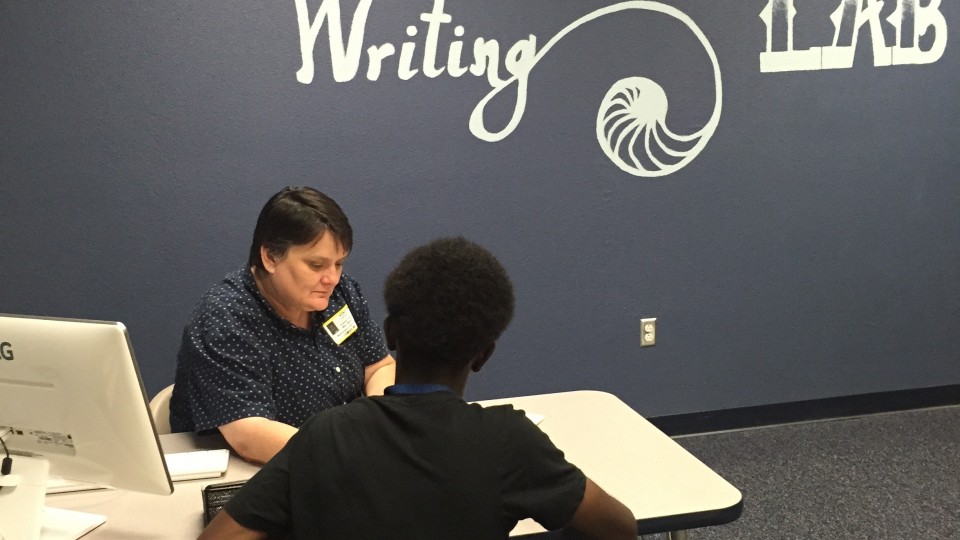Writing Lab offers high school students one-on-one attention
- November 16, 2015
- / Reggie Dogan
- / education

Source: University of West Florida
Since its creation in 1976, the Writing Lab at the University of West Florida has helped students improve the mechanics and quality of their writing assignments.
Now that help is available for high school students.
A satellite lab opened last week in Washington High School’s Innovation Center. A ribbon-cutting ceremony on Monday, Nov. 16, officially solidifies the partnership that aims to give students tutorial assistance on their writing assignments and to help improve scores on the Florida Standards Assessment, the state’s standardized exams.
“A writing lab is probably needed more in high school than at college,” said Mamie Hixon, director of UWF’s Writing Lab. “English teachers expect students to write but sometimes don’t always teach them how.”
During the 2013-2014 school year, School, 54 percent of Washington High 10th graders scored proficient in writing on the FCAT 2.O statewide exam.
West Florida students scored the highest at 81 percent. Escambia High School students had the lowest proficiency score at 45 percent. Students across the state scored 64 percent proficiency in writing.
The Studer Community Institute’s Dashboard includes 16 metrics developed with UWF to measure the economic, educational, social well-being and quality of life in the Pensacola Metro area.
Washington High School’s new Writing Lab is an example of creating partnerships in education that can improve test scores, increase graduation rates and enhance student achievement.
For years, UWF’s Writing Lab has been instrumental in providing support for the community. It has produced a newsletter for businesses, online services, tutoring and on-the-job grammar workshops for educators, administrators, health care and legal professionals, and writers.
In 2009, the Lab partnered with the university’s Department of Continuing Education to offer a Writing Boot Camp for middle and high school students.
Latasha McGruder, Washington’s Instructional Coach, believes the extra attention students will get from the Writing Lab will go a long way in helping students perform better on state exams and become better writers at the same time.
“If you get a D on a paper you never learn what you did wrong, you just take that D and go home,” McGruder said. “But we want our students to become better writers, so if they learn from their mistakes, then hopefully the next time they write a paper, they will see improvement.”
It’s hard to dispute that some form of feedback between teacher and student is crucial to a writer’s development.
But with demands of the classroom, teachers don’t always have the time to provide the feedback that students need on their writing assignments.
That’s where the services of the writing lab can help.
The satellite lab at Washington will work similar to UWF’s Writing Lab. Three lab assistants, dubbed “labbies,” will be available during and after school on Mondays and Thursdays to give students some assistance, feedback and encouragement on their writing assignments.
Before their sessions, students will send their papers to the lab assistants in online dropboxes so they can get a head’s up on what needs work.
The “labbies” then will the meet with the student for a face-to-face, one-on-one interactive editing session to assist in identifying strengths and weaknesses in written assignments.
Students see the value in the lab, because several of them already have started to submit papers and seek assistance from the Writing Lab.
The idea of a writing lab in high school developed from a conversation between Hixon and Virkeisha Palmer, the school district’s high school Language Arts Teacher on Special Assignment, during a professional development workshop for Language Arts teachers.
Palmer envisioned a writing lab in district schools similar to UWF’s Writing Lab.
Hixon liked the idea but wanted to start small at a high school before branching out into several schools.
Palmer envisioned Washington High School as the perfect incubator for the lab because of the work McGruder had done with students and teachers.
At the same time, Alisha Wilson, Washington High’s Innovation Center specialist, had approached the school’s principal about starting a lab.
Wilson taught English at Washington High before becoming the school’s Innovation Center Specialist. She also was involved in UWF Writing Lab’s paper-reading and tutoring services under the direction of Hixon.
In Washington’s Innovation Center, Wilson already had started the Spark Lab, a creative space for student work on projects outside of the classroom.
To make room for The Writing Lab, Wilson cleared out a space in a storage area, moved in some tables, chairs and computers, and spruced up the place with paint and some creative artwork on a back wall.
“The challenge is getting students to the level where they need to be,” said Wilson. “They need as much one-on-one attention as possible.”
Palmer recalled struggling with writing during her high school days, and she believed a lab would ease students’ anxiety and give them tools to become better writers.
“A lot of times students just need to know what’s wrong,” Palmer said. “They also need to know how to fix it.”

 CivicCon launches with a look at good growth in cities
CivicCon launches with a look at good growth in cities
 Building stronger brains one baby, one parent at a time
Building stronger brains one baby, one parent at a time
 SCI debuts commercial on Early Learning City
SCI debuts commercial on Early Learning City
 Entrecon: World class speakers and an opportunity to sharpen skills
Entrecon: World class speakers and an opportunity to sharpen skills
 PYP Quality of Life survey 2017
PYP Quality of Life survey 2017
 EntreCon Pensacola 2016: A look back
EntreCon Pensacola 2016: A look back
 Leadership tip: getting better employee takeaways
Leadership tip: getting better employee takeaways
 Leadership tip: be interested instead of interesting
Leadership tip: be interested instead of interesting
 Leadership tip: delivering difficult messages
Leadership tip: delivering difficult messages
 Brain Bags boost Arc, Early Childhood Court programs
Brain Bags boost Arc, Early Childhood Court programs